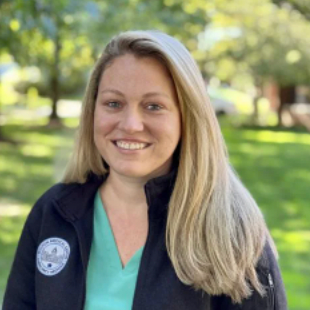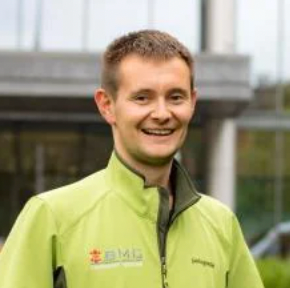Program Director Contact Information

Jessica Corio, PharmD, BCEMP
Clinical Specialist – Emergency Medicine
Director – PGY2 Emergency Medicine

Bryan Gendron, PharmD, BCEMP
Clinical Coordinator - Emergency Medicine
Coordinator – PGY2 Emergency Medicine
We will be having in-person interviews for the 2025-2026 recruitment cycle.
Program Description
The Boston Medical Center PGY2 Emergency Medicine pharmacy residency is among the oldest programs accredited through ASHP. This program offers specialized training in emergency medicine pharmacotherapy in one of the busiest emergency departments in the United States and largest level 1 trauma center in the Northeast region. After orientation to the department, the resident begins a series of rotations and other activities designed to meet the goals and objectives of the PGY2 residency in emergency medicine. Rotation options include adult emergency medicine (I-IV), emergency department administration, pediatric emergency medicine & pediatric intensive care, medical intensive care, trauma intensive care, and toxicology. Longitudinal activities include completion of a research/quality improvement project, participation in the institution’s code blue committee, medication guideline development, and multidisciplinary teaching opportunities. In addition, the resident will complete independent staffing shifts in the emergency department to further develop the clinical and operational skillset to become an effective emergency medicine pharmacy specialist upon completion of the program.
Learn more about Boston Medical Center's Emergency Medicine Services
Learn more about Boston Medical Center's Critical Care Medicine Services
Program Purpose
PGY2 pharmacy residency programs build on Doctor of Pharmacy (PharmD) education and PGY1 pharmacy residency programs to contribute to the development of clinical pharmacists in specialized areas of practice. PGY2 residencies provide residents with opportunities to function independently as practitioners by conceptualizing and integrating accumulated experience and knowledge and incorporating both into the provision of patient care or other advanced practice settings. Residents who successfully complete an accredited PGY2 pharmacy residency are prepared for advanced patient care, academic, or other specialized positions, along with board certification.
Program Outcomes
- Patient care
- Advancing practice and improving patient care
- Leadership and management
- Teaching, education, and dissemination of knowledge
- Management of medical emergencies
- Management of toxicology patients
Core Rotations (4 weeks unless otherwise specified)
- Orientation (5 weeks)
- Emergency Medicine I
- May include co-precepting an APPE student
- Emergency Medicine II
- May include co-precepting an APPE student and/or PGY1 resident
- Emergency Medicine III
- May include co-precepting an APPE student and/or PGY1 resident
- Emergency Medicine - Precepting
- Co-precepting a PGY1 resident or APPE student
- Emergency Medicine- Overnight (2 weeks)
- Pediatric Emergency Medicine & Pediatric ICU
- Toxicology
- Emergency Department Administration
- Emergency Medical Services (1 week)
- Trauma ICU
- Medical ICU
Elective Rotations (4 Weeks - Choice of 1)
- Infectious Diseases-Consult Service
- Cardiac ICU
- Addiction Medicine Consult Service
- Neurocritical Care
Required Longitudinal Rotations
Pharmacy Practice Experience and Leadership (52 weeks)
- Participation in emergency responses (code blue, code stroke)
- Decentralized staffing
- ED evening shift staffing (8 hour shifts) four weeks throughout the year
- ED shift staffing (8 hour shifts) during core EM rotations (residents may participate in ICU independent staffing shifts if interested), number of shifts not to exceed 20% of the learning experience
- Every third weekend staffing (8 hour shifts) of an ED shift (AM or PM)
- Holiday assignments
- 1 major (Thanksgiving Day, Christmas Eve, Christmas Day, New Year's Eve, New Year's Day)
- 1 minor (Memorial Day, Labor Day, Martin Luther King Day)
- Patient Care-Based and Didactic Learning Topic Appendix*
- Institutional Code Blue Committee participation (monthly meeting attendance)
- Monthly resident code debrief sessions with PGY1 residents
- Quarterly code blue simulation attendance
- Monthly pediatrics EM simulation attendance (during EM rotations)
- Assistance with coordinating interviews for perspective PGY2 emergency medicine resident candidates (January/February)
Teaching (48 weeks)
- 1 ACPE-Accredited Continuing Education (CE) lecture (60 minutes)
- 1 Emergency Medicine Resident Conference Lecture (60 minutes)
- 1 Pharmacy Morbidity & Mortality Conference (30 minutes)
- 1 Case Conference (serving as preceptor to PGY1 resident)
- 3 In-services to nurses, physicians, and/or pharmacists
- 3 Journal club presentations
Optional Activities
- Co-precepting APPE students and PGY1 residents on rotation (based on resident's progression)
- American College of Clinical Pharmacy EMED PRN online journal club (30 minutes, if selected)
- Clinical Pearl Presentation at the New England Critical Care Symposium (5 minutes, if selected)
- Boston EMS conference lecture (60 minutes)
- Emergency Medicine Physician Assistant Didactics Lecture (60-90 minutes)
- ECMO simulation participation
Medication Use Systems Collaborative Learning Experience (48 weeks)
- Quality improvement project with submission of a final manuscript per the SQUIRE 2.0 guideline OR research project with IRB submission
- Completion of the Institute for Healthcare Basic Certificate in Quality and Safety (residents will complete as part of quality improvement project)
- Medication guideline/policy development or revisions (2)
- Medication Use Evaluations (1)
ED Medication and Patient Safety Learning Experience (24 weeks)
- Review RLs and develop medication safety response action plans with the ED Patient Safety Specialist (monthly)
- Meet with EM Pharmacy Clinical Coordinator and ED Patient Safety Specialist monthly to discuss RL action plans
- Attend ED Quality and Safety meetings (present medications errors, near misses, and education as needed)
- Information systems support (e.g. CPOE, Smartpump, ADC, Lexicomp) improvements based on development of RL actions plans
Benefits
- Estimated Salary: $64,000
- Vacation time: 12 days
- Office space with computer
- Travel/CE allowance (~$2,600/year): ASHP Midyear Meeting, SCCM, or other opportunities for additional national specialty meetings (e.g. North American Congress of Clinical Toxicology, American College of Emergency Physicians, Society of Academic Emergency Medicine, or American College of Medical Toxicology)
- $750 cafeteria allowance per academic year
- $1000 move/licensure bonus
- Lease guarantee available to minimize security deposit requirements
- Insurance Benefits: health (100% employer-paid option), dental, vision, disability, accidental death and dismemberment, life insurance
 ht
ht 
 English
English Français
Français Deutsch
Deutsch Italiano
Italiano Español
Español Tiếng Việt
Tiếng Việt